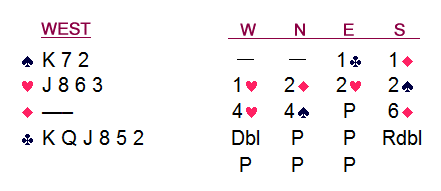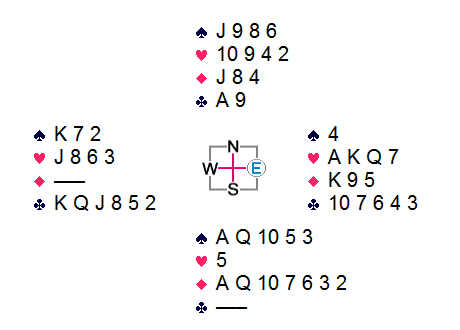

 |
 |
North to Alaska
Sorry I have been incommunicado for so long. My Barbara and I have just
returned from a 7600-mile drive to most points in Alaska that are accessible
by road. Aside from a crippling fire on our ferry boat and unseasonable
cloudiness much of the time, we had a memorable tour. They do some things a
bit differently up north; for example, there was the Dawson City gas station where
the mini-mart doubles as a Sears Catalogue store. Then there were the
homemade parade floats for the annual Talkeetna Moose Dropping
Festival. And I must mention a wonderful ice cream shop named
Hot Licks; it is unfortunate that the local chain's three outlets
exist only in Alaska, for its Malted Grape Nuts offering truly is to die for.
Upon arriving home, my first task was to weed out the accumulated mail.
Upon encountering the July-August issue of the Sacramento Unit
Overcall, I sat down for a breather. Now, let me first assure everyone
that I admire and respect all the (relatively thankless) volunteer effort that goes into
managing a local Unit and preparing articles for its magazine. Nevertheless,
if one is going to write something about bridge rules, one ought — at
the very least — to verify his premises in an ACBL lawbook.
As the Overcall's misleading text helps to perpetuate a common misconception, I feel it necessary to correct an errant paragraph from the Bits & Pieces column, in which it is unilaterally and falsely claimed that dummy cannot call the director during the play of the hand. To clarify this matter, here is the relevant wording of the pertinent regulation (circa 1997):
Law 43 — DUMMY'S LIMITATIONS
[A.1.a] Unless attention has been drawn to an irregularity by another player, dummy should not initiate a call for the Director during play.
[A.1.b] Dummy may not call attention to an irregularity during play.
[A.1.c] Dummy must not participate in the play, nor may he communicate anything about the play to declarer.
Does any of this definition specify that dummy cannot call the director during
play under any circumstances? No. If, for example, a defender
leads out of turn and declarer or the other defender says "It's not your
lead", or if someone discards on a diamond lead, then says "Oh, wait!
I have a diamond", then it is perfectly admissible for dummy to summon the
director. Since the irregularity already has been identified, dummy was
not the first to bring attention to it, and in no way is he helping
partner with the play. In fact, the only subsequent appropriate action is
for someone to call the director, and that person might as as well be the
dummy — especially if he has the most commanding voice!
Tournament directors know these things, of course — or at least, most do. Regarding the incident to which the Overcall referred, I would like to think that either we haven't heard the whole story, or in the actual case dummy actually did something untoward; otherwise, the ruling should have been different.
The spirit of Law #43 is simply to prevent dummy from assisting declarer with
the play in any manner; declarer's task is supposed to be a solo enterprise.
It is improper, for example, for dummy to attempt to inspect a trick, even if he
hasn't been paying attention. It is equally inadmissible for dummy to
identify an apparent revoke until after play is concluded. Even something
such as perusing a defender's convention card should be avoided, as it could
bring partner's attention to some sort of irregularity in the
bidding — or be construed as such a warning. These sorts of
issues are properly addressed after the play.
While we're on this topic, here is another infraction of which 99.44%
of local players are guilty. Declarer asks a question such as
"How many tricks have I lost?" or (to a defender) "How many
tricks do you have?" Invariably someone provides an answer,
yet something is very wrong with this picture. For the defenders to
respond is not in their best interests, as they are under no obligation to
help declarer count his tricks. More importantly, it is illegal
for dummy to answer such a question, because responding to it would
constitute assistance with the play, which is prohibited by the regulations.
Declarer might as well ask dummy who has the missing ace of clubs, because
he might happen to have seen it already! More seriously, dummy's legal
option is to keep his own played cards in the time-honored
won-lost orientation, for declarer to inspect as desired.
So, dear readers — I implore you not to become hot and bothered at me the next time I attempt to prevent this particular infraction at your table. The error is rampant, and somebody needs to take a stand. Think of me as the Johnny Appleseed of Legal Comportment; of course, it is understood that this quest tends to preclude me from consideration for the annual Dante's Infernal Congeniality Award.

The Anchorage duplicate club has a great facility, with room for
30+ tables comfortably. The bridge up here is as different as everything
else. For example, no one thought it unusual when an opponent opened with
1♦ holding 5-5 in the majors. Also, on the
last round of this night game (after 10 p.m.), one table of players moved
farther away from the window because the sun was in their eyes!
See how well you fare as West on the very first board of the session:

Partner's 2♥ bid was a 4-card raise. What is your opening lead?

If you opted for a club lead, you lost 1830 points; for this was the full deal:

Like a dunce, I did lead a club, and they made it. When an opponent
jumps to a slam, that normally indicates a void — most likely in
your side's longest suit. My careless choice cost us first place in the
event. Had the defense started with a heart lead, declarer would have
been unable to avoid the loss of three tricks against best play thereafter.
And yes, south's bidding was insane; but this is Alaska, where folks tend to
have a brighter outlook on things — at least in the summertime!